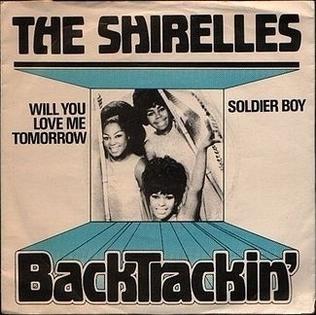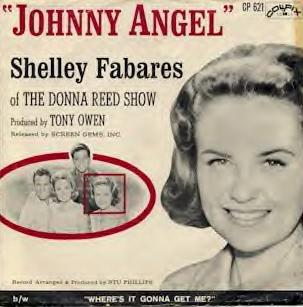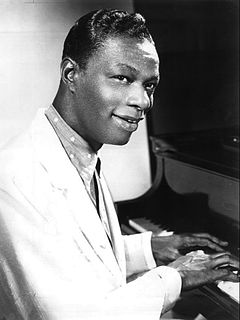
The Isley Brothers are an American musical group originally from Cincinnati, Ohio, that started as a vocal trio consisting of brothers O'Kelly Isley Jr., Rudolph Isley and Ronald Isley in the 1950s. With a career spanning over seven decades, the group has been cited as having enjoyed one of the "longest, most influential, and most diverse careers in the pantheon of popular music".

The Marcels was an American doo-wop group known for turning popular music songs into rock and roll. The group formed in 1959 in Pittsburgh, Pennsylvania and signed to Colpix Records with lead Cornelius Harp, bass Fred Johnson, Gene Bricker, Ron Mundy, and Richard Knauss. The group was named after a popular hair style of the day, the marcel wave, by Fred Johnson's younger sister Priscilla.

The Spinners are an American rhythm and blues vocal group that formed in Ferndale, Michigan, in 1954. They enjoyed a string of hit singles and albums during the 1960s and 1970s, particularly with producer Thom Bell. The group continues to tour, with Henry Fambrough as the only original member.

"Summertime Blues" is a song co-written and recorded by American rock and rockabilly artist Eddie Cochran. It was written by Cochran and his manager Jerry Capehart. Originally a single B-side, it was released in August 1958 and peaked at number 8 on the Billboard Hot 100 on September 29, 1958 and number 18 on the UK Singles Chart. It has been covered by many artists, including being a number-one hit for country music artist Alan Jackson, and scoring notable hits in versions by Blue Cheer, The Who, and Brian Setzer, the last of whom recorded his version for the 1987 film La Bamba, in which he portrayed Cochran. Jimi Hendrix performed it in concert.
Ocean was a Canadian gospel rock, soft rock band formed in 1970 in Toronto, Ontario. They are best known for their 1971 single "Put Your Hand in the Hand", penned by Gene MacLellan. The single sold over one million copies, earning a gold disc in the United States from the Recording Industry Association of America, on 3 May 1971. The single peaked at No. 2 on the U.S. Billboard Hot 100, and reached No. 4 on the Billboard Adult Contemporary chart.
"Blue Moon" is a classic popular song written by Richard Rodgers and Lorenz Hart in 1934. It may be the first instance of the familiar "50s progression" in a popular song and has become a standard ballad. The song was a hit twice in 1949 with successful recordings in the U.S. by Billy Eckstine and Mel Tormé.

"Please Mr. Postman" is a song written by Georgia Dobbins, William Garrett, Freddie Gorman, Brian Holland and Robert Bateman. It is the debut single by the Marvelettes for the Tamla (Motown) label, notable as the first Motown song to reach the number-one position on the Billboard Hot 100 pop singles chart. The single achieved this position in late 1961; it hit number one on the R&B chart as well. "Please Mr. Postman" became a number-one hit again in early 1975 when the Carpenters' cover of the song reached the top position of the Billboard Hot 100. "Please Mr. Postman" has been covered several times, including by the British rock group The Beatles in 1963.

"You've Really Got a Hold on Me" is a song written by Smokey Robinson, which became a 1962 Top 10 hit single for the Miracles. One of the Miracles' most covered tunes, this million-selling song received a 1998 Grammy Hall of Fame Award. It has also been selected as one of The Rock and Roll Hall of Fame's 500 Songs that Shaped Rock and Roll. It was recorded by English rock group the Beatles for their second album, With the Beatles (1963). Many other musicians also recorded versions.
"Heartaches" is a popular song with music by Al Hoffman and lyrics by John Klenner. The song was published in 1931, was placed on all of the record labels of the time, but it was not a particularly big hit at the time.

"Sugar, Sugar" is a song written by Jeff Barry and Andy Kim. It was originally recorded by the cartoon band the Archies. This version peaked at No. 1 in the US on the Billboard Hot 100 chart in 1969 and remained there for four weeks. It also peaked at No. 1 on the UK Singles chart in that same year for eight weeks. The song became a hit again in 1970 when rhythm and blues and soul singer Wilson Pickett took it back onto the charts with his own version.

"Shop Around" is a song originally recorded by The Miracles on Motown Records' Tamla subsidiary label. It was written by Miracles lead singer Smokey Robinson and Motown Records founder Berry Gordy. It became a smash hit in 1960 when originally recorded by The Miracles, reaching number one on the Billboard R&B chart, number one on the Cashbox Top 100 Pop Chart, and number 2 on the Billboard Hot 100 chart. It was The Miracles first million-selling hit record, and the first-million-selling hit for the Motown Record Corporation. This landmark single was a multiple award winner for The Miracles, having been inducted into the Grammy Hall of Fame in 2006, inducted into The Rock and Roll Hall of Fame as one of The 500 Songs That Shaped Rock and Roll, and honored by Rolling Stone as #500 in their list of The 500 Greatest Songs of All Time.
The Miracles were the Motown Record Corporation's first group and its first million-selling recording artists. During their nineteen-year run on the American music charts, The Miracles charted over fifty hits and recorded in the genres of doo wop, soul, disco, and R&B. Twenty-six Miracles songs reached the Top Ten of the Billboard R&B singles chart, including four R&B number ones. Sixteen of the Miracles' songs charted within the Top 20 of the Billboard Hot 100, with seven of those songs reaching the Top Ten and two – 1970's "The Tears of a Clown" and 1975's "Love Machine" – reaching number-one. A third song,the million-selling "Shop Around", reached #1 on the Cash Box magazine Top 100 Pop chart. The Miracles also scored 11 U.S. R&B Top 10 Albums, including 2-#1's. According to several websites, the Miracles are one of the most oft-covered groups in recorded history and the most covered Motown group ever. Their music and songs have influenced artists all over the world – in every major musical genre – over the last 50 years. At # 32, The Miracles are the highest-ranking Motown group on Rolling Stone Magazine's list of "The 100 Greatest Artists of All Time." They also have the distinction of having more songs inducted into the Grammy Hall of Fame than any other Motown group.
"Heartaches by the Number" is a popular country song written by Harlan Howard, and published in 1959. Sheet music for the song was a best seller in both the US and Britain in January 1960.
Colpix Records was the first recording company for Columbia Pictures–Screen Gems. Colpix got its name from combining Columbia (Col) and Pictures (Pix). CBS, which owned Columbia Records, then sued Columbia Pictures for trademark infringement over the Colpix name.

"Surfin' Safari" is a song by American rock band the Beach Boys, written by Brian Wilson and Mike Love. Released as a single with "409" in June 1962, it peaked at number 14 on the Billboard Hot 100. The song also appeared on the 1962 album of the same name.
"Chapel of Love" is a song written by Jeff Barry, Ellie Greenwich and Phil Spector, and made famous by The Dixie Cups in 1964, spending three weeks at number one on the Billboard Hot 100. The song tells of the happiness and excitement the narrator feels on her wedding day, for she and her love are going to the "chapel of love", and "we'll never be lonely anymore." Many other artists have recorded the song.

"Will You Love Me Tomorrow", sometimes known as "Will You Still Love Me Tomorrow", is a song written by Gerry Goffin and Carole King. It was originally recorded in 1960 by the Shirelles, who took their single to number one on the Billboard Hot 100 chart. The song is also notable for being the first song by a black all-girl group to reach number one in the United States. It has since been recorded by many artists over the years, including a 1971 version by co-writer Carole King.

"You Send Me" is a song written and originally recorded by American singer Sam Cooke, released as a single in 1957 by Keen Records. Produced by Bumps Blackwell and arranged and conducted by René Hall. The song, Cooke's debut single, was a massive commercial success, becoming a No. 1 hit on both Billboard's Rhythm & Blues Records chart and the Billboard Hot 100.

"Johnny Angel" is a song written and composed by Lyn Duddy and Lee Pockriss. The song was originally recorded by both Laurie Loman and Georgia Lee, but those two versions were not successful. It first became a popular hit single when it was recorded by Shelley Fabares in the fall of 1961; she took it to No. 1 on the Billboard Hot 100 Chart when the song was released in 1962. In the same year, British singer Patti Lynn had a moderate hit on the UK Singles Chart with her cover of the song. The American pop music duo The Carpenters recorded "Johnny Angel" in 1973 as part of a medley of oldies on side two of their album Now & Then.

"Mona Lisa" is a popular song written by Ray Evans and Jay Livingston for the Paramount Pictures film Captain Carey, U.S.A. (1950). The title and lyrics refer to the renaissance portrait Mona Lisa painted by Leonardo da Vinci. The song won the Oscar for Best Original Song in 1950.













